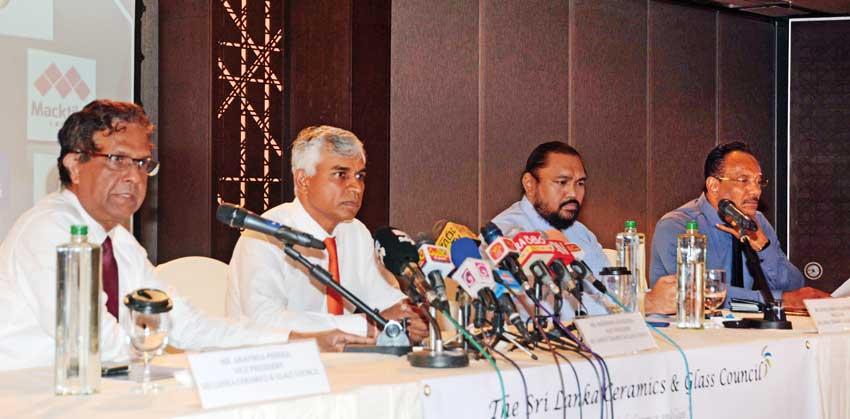06 Jan 2021 - {{hitsCtrl.values.hits}}

From left: SLCGC Vice President Aravinda Perera, SLCGC Vice President Mahendra Jayasekera, SLGCC President Anura Warnakulasooriya and SLCGC Member S.H.B. Karunaratne
Pic by Pradeep Pathirana
By Nishel Fernando
Sri Lanka Ceramics and Glass Council (SLCGC) yesterday sought government intervention to update Sri Lanka Customs’ (SLC) ‘Test book’ value of key ceramic products imported into the country in the absence of a proper mechanism to implement the Anti-Dumping and Countervailing Duties Act of 2018 to protect local producers from unfair competition.
Addressing reporters in Colombo, SLCGC member and Art Decoration International (Pvt) Ltd. Founder Chairman, S. H.B. Karunaratne appealed to the government to intervene to update the stated book value for imported ceramic items in SLC’s Valuation Department from the current low and unrealistic rates.
“To import a complete set of ceramic sanitaryware, which weighs 65 kgs and includes a commode, tank, basin, pedestal, seat cover and water fittings, the book value of valuation stands at US$ 35.00/Rs.6,350. This is an unrealistic amount as a complete set of ceramic sanitaryware cannot be manufactured for such a low cost,” he said.
Therefore, SLCGC sought State intervention to correct this unrealistic valuation by amending the SLC’s “Test book” value to US$100.
“Once this is amended, local manufacturers will be able to compete with imports and it will also prevent cheap inferior quality items being dumped into our country. And this will also help to stop the huge outflow of foreign exchange,” Karunaratne added.
He pointed out that this would help Sri Lanka to resume sanitaryware imports and thereby pacify the World Trade Organization (WTO).
“Importers can continue their businesses, while the consumer will also be safeguarded,” he added.
Import restrictions still remain in force for sanitaryware products.
Sri Lanka’s ceramic industry saw its market shrinking by 35-40 percent last year mainly due to adverse impacts of COVID-19, according to SLCGC Vice President Mahendra Jayasekera.
However, he noted that prior to February last year, before the import restrictions came into force, Sri Lanka’s ceramic manufacturers, in particular the tile industry, had seen their inventories running up to 7 to 10 months, mainly due to influx of “cheap” and “low quality” imports of such items.
Since, import restrictions came into place, Jayasekera noted that most of these inventories were sold out. He stressed that local manufacturers haven’t raised their prices despite the import restrictions.
Although listed entities reported a surge in their profits in the last couple of quarters, he said in the upcoming quarter the profits of these entities might come down as these entities now depend on current productions with the most of the piled up inventories being already sold out.
SLCGC Vice President Aravinda Perera noted that if the current environment is maintained over the next two years, the country would be able to become self-sufficient in ceramic tiles and sanitaryware products.
SLCGC said current industry players have earmarked around Rs.20 billion worth of investments to expand their operations in the country.
Further, Jayasekera noted that several new entrants could also be expected during this year to meet the local demand.
According to SLCGC, local manufacturers currently fulfill around 60 percent of the local demand for ceramic products.
“Äs of now the ceramic industry of Sri Lanka has 20,000 employees, and with the current government policy, manufacturers are willing and ready to invest around Rs.20 billion to expand their current production and to set up new factories, which will in turn create around 15,000 – 20,000 new job opportunities for our youth,” SLCGC said.
While welcoming competition, Jayasekera predicted that Sri Lanka could experience an excess production in two years, enabling the country to export such products.
However, SLCGC expressed its concerns on the reduction of duty and cess imposed on ceramic imports by approximately 10 percent by the last budget despite the government’s assurance in supporting local industrialists.
They insisted that policy consistency is the most crucial aspect in supporting local industries and entrepreneurs.
The Council also sought government’s initiative to raise the minimum value of the duty for tiles to be raised to US$ 5 per square meter.
Further, it also urged the government to come up with a realistic policy framework in terms of mining resources such as ball clay.
Karunaratne pointed out that the current Agrarian Development Act requires amendments to facilitate mining in paddy fields to source ball clay, which is a crucial raw material for the industry.
The Council emphasised that the informal sector has dominated the mining of such raw material due to excessive bureaucracy. Therefore, it urged the government to remove the red tape and to let the formal industries get engaged in such mining activities ensuring environmental and social responsibilities.
19 Nov 2024 7 hours ago
19 Nov 2024 7 hours ago
19 Nov 2024 9 hours ago
19 Nov 2024 19 Nov 2024
19 Nov 2024 19 Nov 2024